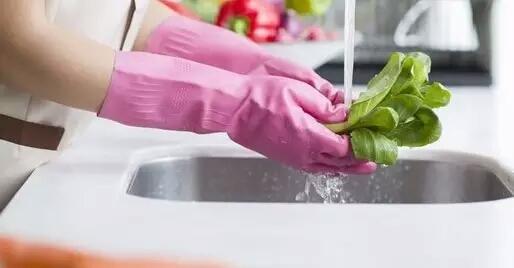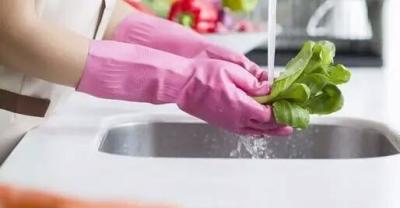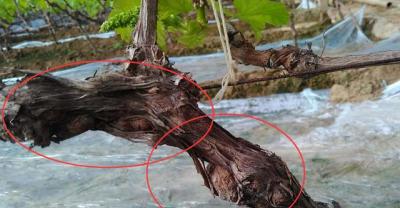Eight tips to help you remove pesticide residues from fruits and vegetables as much as possible
There are almost no pesticides in vegetables grown in the natural environment. Many vegetable farmers and agricultural experts say so.

Some people are not convinced, I grow my own vegetables without medicine. As a result, they often suffer from insect pests before the fruit is ripe. People can't eat vegetables with insect pests.
The use of pesticides can not be avoided, so try to reduce the residue. Here are 8 tips to help you remove pesticide residues from fruits and vegetables as much as possible.
Cymbal
Eight tricks to get rid of agricultural residues
(1) scrubbing under running water
Organophosphorus insecticides are insoluble in water, and this method can only remove part of the pesticides. However, washing is the basic method to remove other dirt and pesticide residues from vegetables and fruits.
It is found that rubbing during cleaning plays a key role in the removal of pesticides. Therefore, when we do not know the types of pesticide residues in vegetables, it is recommended to wash them with running water and scrub gently at the same time for better results.
Be careful not to soak for too long when cleaning, otherwise nitrite may be produced, which may damage your health.
(2) Taomi water / alkaline noodle water (baking soda)
Amoy rice water and baking soda water are alkaline, and organophosphorus pesticides decompose rapidly in alkaline environment, so they can reduce harmful substances in fruits and vegetables.
For the choice of Amoy rice water, just Amoy rice water, alkalinity is not very obvious, can be placed for a period of time, fermentation, its alkalinity will also increase, the effect is better. In addition, Amoy rice water itself has a certain viscosity, can absorb some pesticides and chemicals attached to the food surface, such as grapes, mulberries, strawberries and other fruits that are not easy to wash, it is also relatively safe to use Amoy rice water.
(3) flour water
Washing vegetables with flour is also OK, but it should be reminded that compared with rice washing water, the alkalinity of flour water is slightly lower, and the ability to decompose pesticide residues will be slightly lower, especially for the decomposition of phosphorus-containing pesticides.
(4) Salt water
Compared with clear water, light salt water itself has the effect of sterilization. Soaking in brine can also reduce the possible pesticide residues in fruits and vegetables. In addition, light salt water has a large solubility to formaldehyde and can dissolve formaldehyde residues that may exist in fruits and vegetables.
(5) Fruit and vegetable cleaning agents
The practice of washing vegetables with fruit and vegetable detergent is advisable. if the quality of the detergent can be guaranteed, the washing effect will generally be better than rice washing water.
However, it should be noted that some fruit and vegetable detergents contain chemical components, and sometimes the safety is relatively poor compared with the above methods. Therefore, when buying fruit and vegetable detergents, we should still pay attention to what ingredients they contain.
(6) peeling fruits and vegetables
Most pesticides generally remain on the skin of fruits and vegetables, vegetables and fruits with uneven or hairy appearance are more likely to be contaminated with pesticides, and it is difficult to clean them completely, so peeling is a better method, such as cucumbers, carrots, apples, pears and so on. It's best to peel and eat.
The World Health Organization has also recommended thoroughly peeling root vegetables and fruits specifically for China.
(7) blanch with hot water
High temperature heating can decompose pesticides, and James water can remove about 80% of pesticide residues, especially leafy vegetables such as spinach, cabbage, rape, cabbage, cabbage and cabbage, while beans, celery and cauliflower can be scalded with boiling water for a few minutes to reduce pesticide residues by 30%.
Wash the surface contaminants with clean water, then boil in boiling water for 2 to 5 minutes, remove and rinse with clean water for 1 or 2 times.
(8) leave it for a while before eating
Pesticides can be slowly decomposed into substances that are harmless to the human body over time (oxygen in the air and enzymes in vegetables have a certain decomposition effect on pesticide residues), so melons, fruits and vegetables that are easy to be preserved can reduce pesticide residues through storage for a certain period of time. It is recommended that newly picked unpeeled melons and fruits should not be eaten immediately.
Tips
Wormeye vegetables may not be safer.
Many people think that vegetables with wormeyes are not contaminated with pesticides and are safer to eat. But in fact, whether there are wormeyes or not can not tell whether pesticides are used. According to the growth cycle of vegetables, vegetable farmers often spray pesticides at an early stage in order to prevent diseases and insect pests. The vegetables that consumers see with wormeyes are often vegetables that have been on the market very recently, and pesticide residues may be higher. So don't blindly think that vegetables with wormholes are not sprayed with pesticides.
- Prev

It is a vegetable that does not use pesticides and fertilizers, and can be called "human brain gold"! I don't know. It's too bad.
Old people often say that you can't judge people by their appearance. In fact, this is the case with most things. Many unattractive foods contain too many nutrients that we don't know about.
- Next

Attention, farmers: pay attention to these problems when using pesticides in the future!
Farmers farm in the orchard. Most of our farmers make a living by farming, and the output and quality of agricultural products in the field will directly affect our income. And the problem of diseases and insect pests.
Related
- Fuxing push coffee new agricultural production and marketing class: lack of small-scale processing plants
- Jujube rice field leisure farm deep ploughing Yilan for five years to create a space for organic food and play
- Nongyu Farm-A trial of organic papaya for brave women with advanced technology
- Four points for attention in the prevention and control of diseases and insect pests of edible fungi
- How to add nutrient solution to Edible Fungi
- Is there any good way to control edible fungus mites?
- Open Inoculation Technology of Edible Fungi
- Is there any clever way to use fertilizer for edible fungus in winter?
- What agents are used to kill the pathogens of edible fungi in the mushroom shed?
- Rapid drying of Edible Fungi

